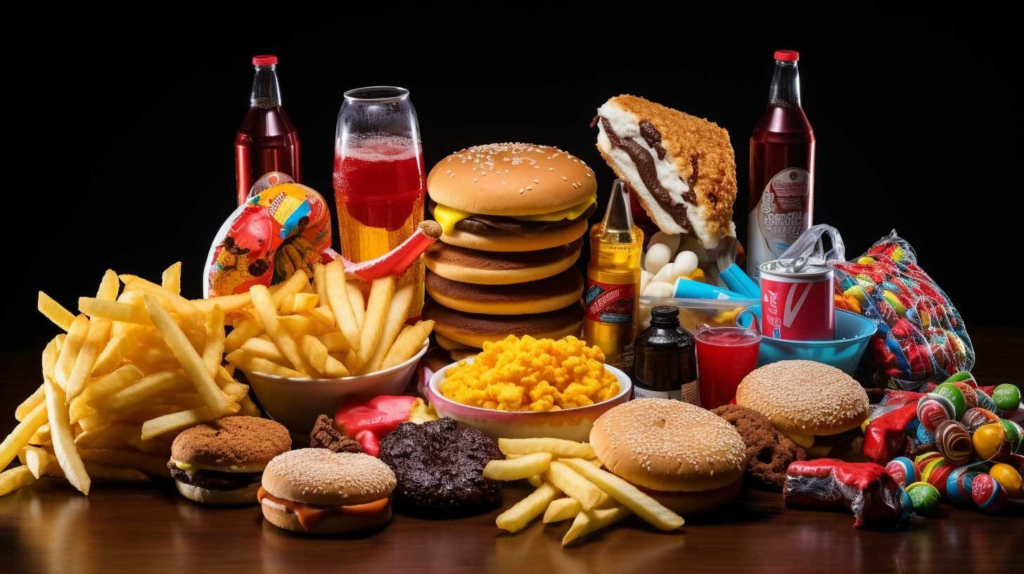Have ever found yourself staring at the bottom of an empty chip bag and realized that you have just devoured the whole thing. If you have, you are not alone! Why is junk food is addictive and how to stop eating it.

“Bet you can’t eat just one“
Why is Junk Food So Addictive?
Since 1967, Lays has been challenging people with this slogan “Bet you can’t eat just one.” Lays is basically saying that their chips are so tasty that you can’t eat just one. Foods like chips as well as crackers, candies, and some seemingly healthy foods often are ultra-processed giving our tastebuds the perfect combination of sugar, salt and fat that we cannot resist. Our brain tells our body to send more and our brains respond with a green light letting you chomp the next 10 chips or more.
According to a recent study by the University of Michigan and medical professionals like Dr. Darria Long Gillespie, the ingredients in ultra-processed foods can override our natural signals of fullness. As a result, you keep eating all those snacks without feeling fed or full. They also release a quick hit of dopamine, signaling you to want more.
What happens when you overindulge in these ultra processed foods? Well…the sad truth is that most of us gain weight, suffer from stomach problems and can end up with some serious chronic health issues.
Why do food companies make junk food?
Food companies are in business to make money. If a product takes off and sells then the food companies make money. Its simple.
Big food spends millions of dollars trying to find the perfect sugar, salt and fat ratio to keep you wanting more. These may appear to be like natural ingredients but may sugars, fats, and salts are falling into a new category of foods called excitotoxins. Along with this category of chemicals, there are synthetic, artificial food-like substances that can hijack your brain, compelling you to constantly seek more. The combination of these foods triggers the release of dopamine, the brain’s expression of pleasure. Our brains tell us to treat ourselves.
In the US, some states are banning these chemicals. But this should tell you something when big food producers make a product for export it has cleaner, healthier ingredients that the US version because foreign regulations require it. So we in the US truly get stuck with the junk.
Food companies do not want us to stop addiction to junk food.
Some people think big food companies shouldn’t do this, while others say we all just need a bit more willpower. New research says that willpower may not be enough. Whether it is our fault for succumbing to the food, or the food producer’s fault for hijacking us with taste, it really doesn’t matter. You can break free from the hijack.
What does junk food do to your body and your brain?
Excitotoxins hijack your senses. Some folks have a quick reaction to this food, feeling low on energy, anxious, and mentally fuzzy. The presence of certain additives may lead to instant reactions, including migraine headaches, gastrointestinal problems, and skin irritations. Longer term effects include increased blood pressure, increased inflammation, digestive issues, compromised immune system, memory issues, learning problems, allergies, heart disease, and hormonal disruption.
According to the Cleveland Clinic, unhealthy diets increase your chances of developing depression, cancer, type 2 diabetes, heart disease and other chronic conditions.
Weight gain
In a news report from CBS, they quote a study that looked at over 44,000 men and women over eight years. In the research, volunteers who consumed ultra-processed foods after two weeks ate about 500 more calories a day and gained two pounds. However, when the same participants switched to an unprocessed diet with the same amount of calories, they lost an average of two pounds over the same period.
Illness
Ultra-processed food not only contains salt, sugar, and fat but also an abundance of ingredients and chemicals to preserve it for longer. Your body becomes a battleground for chemicals as it digests the food you’ve swallowed.
“Consumption of ultra-processed foods, on a regular basis, significantly increased all-cause mortality,” said Lindsay Malone, a registered dietitian with the Cleveland Clinic. “This is typically going to refer to things like heart disease, or complications from obesity or diabetes.”
Death
Just last month, a one-chip challenge food was pulled from store shelves after a teen allegedly died from eating the chip. New research on ultra-processed foods finds a 14% increased risk of death for people who consumed a lot of items that contain extra additives.
How to take control
If you’re tired of big food pulling the strings, you might be ready to take action. Goals or fears often push people to change. Perhaps you have a fitness goal that is driving you to better health. You could also be suffering from food-related illness such as digestive issues, brain fog, skin issues or hormonal problems such as PCOS.
Whether it is hope for a better body or fear of illness driving your decision, taking steps to reduce the amount of toxins your body absorbs through food additives can be started today. A goal could be to eliminate some unhealthy foods in order to feel better. In either case, the path is riddled with daily hurdles that can impede your progress. Stay vigilant. There are many easy off ramps that can derail your efforts to stop junk food addiction.
Easy Off Ramp Examples
- Choosing fast food drive-through over a healthier pickup or home-cooked option.
- Drinks loaded with sugar, caffeine, and chemicals were our go-to when we didn’t sleep.
- Giving in to junk food and candy to keep kids quiet.
- The fear of offending a host by rejecting food that doesn’t fit your eating plan.
Can you relate to any of these?
When you encounter these, remember your goal. Return back to your feelings and desires to feel fabulous, look stunning, and achieve excellent wellness. Keeping your goal in mind can help you transform your desire into a powerful catalyst to achieve your goals, whether it’s shedding pounds, sculpting your physique, enhancing your well-being, or all of the above.
5 ways to stop junk food addiction
Skip Convenience Foods
Last year I was gifted a Retro Betty Crocker Cookbook. Betty Crocker was a fictitious woman of 1930s. and it was a brilliant move by General Mills to pump up the marketing of their convenience foods. One popular product was a salad topping of imitation bacon called Bac-Os. It is described as a “Meat Analog” and General Mills first spun protein called Bontrae. Thus was the fake meat of the 20th century. Much like the “Beyond Burger” of today.

photo: http://nadiaberenstein.com/blog/2017/6/5/tastethefuture
Focus on Adding Health to your Life
Many people equate fitness, health and progress with self deprivation. Going all in on an extreme diet can be hard. Forget about what you can’t have, just go for the outstanding version of a real food option. At one point in time, food producers flooded store shelves with chips, cookies, and crackers that were fat free and sugar free to make them healthier. Honestly, they were often flavorless and loaded with chemicals. If you’re going to indulge, why not balance it out with a health adder for your next snack, like sliced fruit or veggies for your next snack?
Had a tough day, don’t turn to food, phone a friend, take a walk, or use a few deep breaths to bring your mind and body into balance.
Avoid shiny packages
Snack food in shiny packages often has two problems. One it is often a highly-processed snack and two, the packaging is bad for the planet. Shiny packaging is a blend of metal and plastic. It cannot be recycle as either and ends up as eternal trash.
If you must buy packaged items, reduce the packaging buy a big bag and repackage your self. Also not all convenient packaged foods are highly processed. Convenient items like frozen fruits and vegetables offer quick and easy healthy options, perfect for busy schedules.
Select Real Food
Make it a habit to always read the label when buying packaged food. When it comes to ingredients, less is definitely more. Use ingredients you’d find in your own kitchen, with names you know.
If you cannot pronounce it, understand it or just have no idea what it is. Pass on it.
Take Small Steps to Big Results, Do a Daily Item Swap
Small steps can lead to quick success and change your long-term habits.
Stay on track with your food swaps and minimizes the amount of ultra-processed foods in your week. One swap a week to begin with can make a difference in how you feel and your overall toxic load from chemicals in your food. The foods you once saw as forbidden gradually lose their power to tempt you. Your body becomes nourished and will naturally crave foods and activities that offer a greater sense of wellness.
References:
- https://www.thenewdaily.com.au/money/2014/10/21/how-to-say-not-to-junk-food-in-the-office
- https://www.latimes.com/business/story/2023-09-07/company-pulls-spicy-one-chip-challenge-from-store-shelves-as-massachusetts-investigates-teens-death
- https://health.clevelandclinic.org/heres-how-fast-food-can-affect-your-body/
- https://news.umich.edu/identifying-some-foods-as-addictive-could-stimulate-research-shift-attitudes/
- https://www.cbsnews.com/philadelphia/news/junk-foods-can-lead-to-premature-death-study-finds
- http://nadiaberenstein.com/blog/2017/6/5/tastethefuture
Personal Note
For years, I struggled with low energy levels, frequent digestive issues, and an overall imbalance in my body. I realized that my food choices played a crucial role in my overall well-being. By prioritizing whole, unprocessed foods and incorporating more fruits, vegetables, and plant-based proteins into my diet, I noticed a significant shift. I felt more vibrant, energized, and mentally clear. Eating healthier allows me to better manage stress and support my immune system, which is especially vital during these challenging times. Remember, our bodies are intricate ecosystems that need nourishment to thrive.
Read more on ultra processed food here: https://thecleanerplanetplaybook.com/blog/food

Photo: https://news.umich.edu/identifying-some-foods-as-addictive-could-stimulate-research-shift-attitudes/



